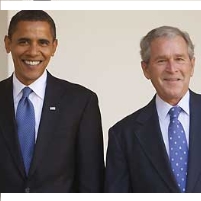Bush Admits to Breaking U.S. Anti-Torture Law…but No Prosecution Planned
Friday, November 12, 2010

Despite former President George W. Bush’s recent admission about authorizing torture, the Obama administration has given no indication it wants to reopen the controversy over how suspected terrorists were treated during the “war on terror.” At least six other countries have investigated their nations’ involvement in the Bush administration’s torture campaign.
During media interviews intended to promote the publication of his memoir, Decision Points, Bush has made it clear that he approved the use of “enhanced interrogation techniques,” including waterboarding, against detainees. The former commander-in-chief also said the use of torture helped saved lives, including those in the United Kingdom—an assertion dismissed by Prime Minister David Cameron.
“I think torture is wrong and I think we ought to be very clear about that,” Cameron told the media. “And I think we should also be clear that if actually you’re getting information from torture, it’s very likely to be unreliable information.”
Human rights groups have called upon the U.S. Department of Justice to investigate Bush and determine if he broke the law by authorizing the CIA to subject detainees to waterboarding and other forms of torture.
“Under international law, the former president’s admission to having authorized acts that amount to torture are enough to trigger the USA’s obligations to investigate his admissions and if substantiated, to prosecute him,” wrote Amnesty International. “Failure to investigate and prosecute in circumstances where the requisite criteria are met is itself a violation of international law.”
In addition to violating international law, Bush admitted to violating U.S. law. The War Crimes Act of 1996, promoted by Republicans and passed by both houses of Congress without a dissenting vote, made it a federal crime to commit a “grave breach” of the Geneva Conventions, meaning the deliberate “killing, torture or inhuman treatment” of detainees. It includes “outrages upon personal dignity, in particular humiliating and degrading treatment.” Violations of the War Crimes Act that result in the death of a detainee carry the death penalty and they do not have a statute of limitations. Although it was initiated to prosecute foreigners who mistreat American prisoners, Congress, in a display of bipartisan support for human rights, applied the law as well to American treatment of foreign prisoners of war, reasoning that Americans should hold themselves to the same standards they hold others.
President Bush was clearly aware that he might be violating the War Crimes Act. In a memo to Bush dated January 25, 2002, then White House counsel Alberto Gonzales suggested that Bush find a way to avoid the rules of the Geneva Conventions as they relate to prisoners of war because that “substantially reduces the likelihood of prosecution under the War Crimes Act.”
A week later, Attorney General John Ashcroft sent a memo to the president also stressing that opting out of the Geneva treaty “would provide the highest assurance that no court would subsequently entertain charges that American military officers, intelligence officials, or law enforcement officials violated Geneva Convention rules relating to field conduct, detention conduct or interrogation of detainees.” Ashcroft reminded Bush, “The War Crimes Act of 1996 makes violation of parts of the Geneva Convention a crime in the United States.”
President Bush and his administration also faced the problem that Sections 2340-2340A of the US Code, Title 18, outlawed torture. So, to be on the safe side, the Bush administration redefined the word “torture.” In an August 2, 2002, memo signed by Jay Bybee, the head of the Justice Department's Office of Legal Counsel, the department lawyers proposed sidestepping the law by narrowing the designation of an act of torture as one that caused suffering “equivalent to the pain accompanying serious physical injury, such as organ failure, impairment of bodily function, or even death.” Even then it did not qualify as torture if the torturer was seeking information from the victim. An action only counted as torture if the torture was gratuitous.
-David Wallechinsky, Noel Brinkerhoff
USA: Former President’s Defense of Torture Highlights Need for Criminal Investigations (Amnesty International) (pdf)
Cameron Attacks Bush Waterboarding Claims (by Peter Wozniak, Politics.co.uk)
Other Countries Probing Bush-Era Torture—Why Aren't We? (by Shashank Bengali, McClatchy Newspapers)
Is George Bush Guilty of War Crimes...and Who Cares? (by David Wallechinsky, Huffington Post)
- Top Stories
- Unusual News
- Where is the Money Going?
- Controversies
- U.S. and the World
- Appointments and Resignations
- Latest News
- Trump to Stop Deportations If…
- Trump Denounces World Series
- What If China Invaded the United States?
- Donald Trump Has a Mental Health Problem and It Has a Name
- Trump Goes on Renaming Frenzy






Comments